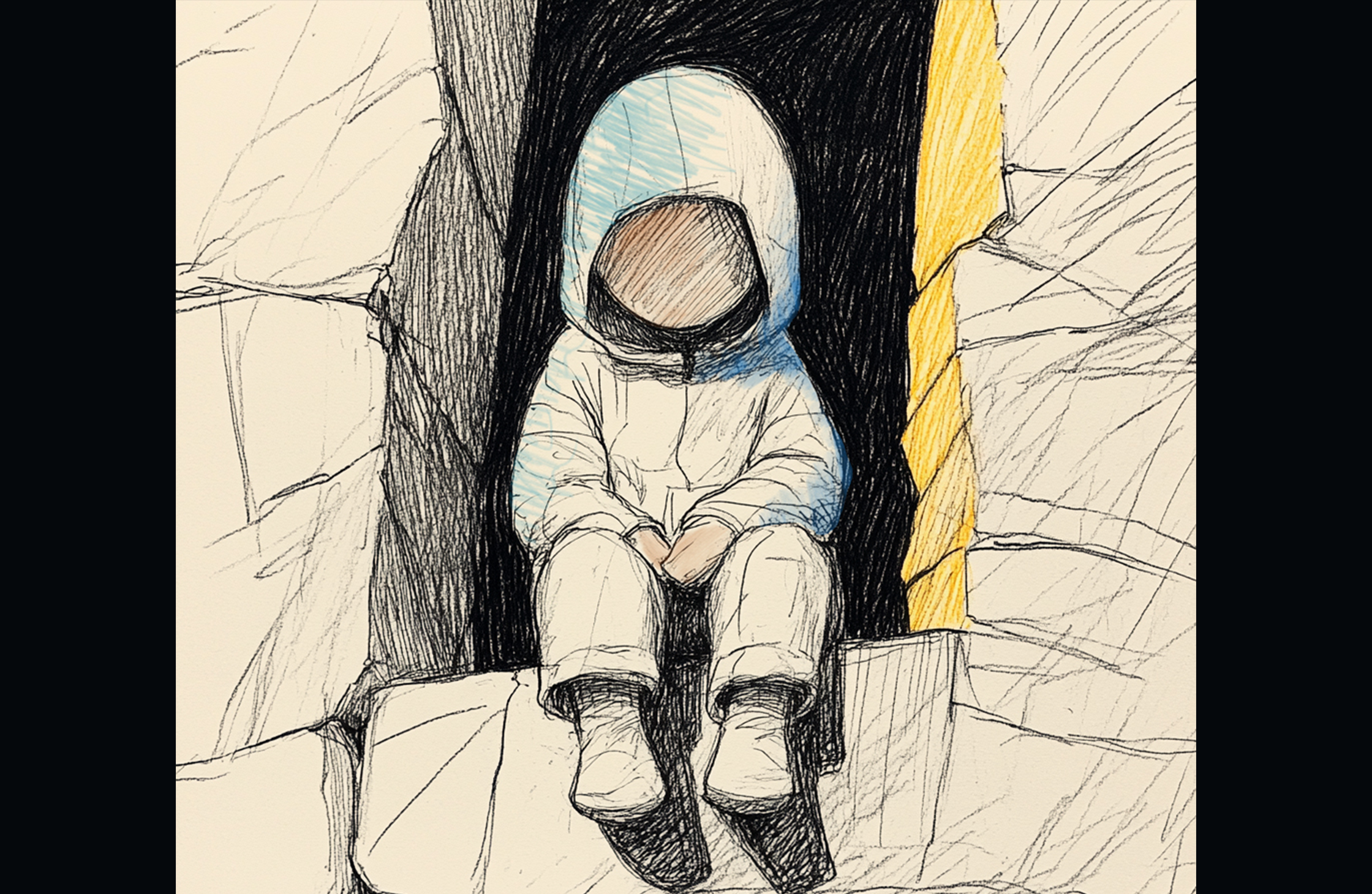This article is bilingual! Scroll down for the English translation.
Entre los cabos sueltos que deja la notable insatisfacción personal guiada por la búsqueda de empoderamiento perdurable, partículas si es que así se le pueden etiquetar o nombrar a las acciones marginadas en el socavón formado del camino de la grietas donde en algun tiempo atras sin dudas existe el instinto justo de lucha.
El dicho bien dicho consiste en lo siguiente, al final de todo la misma ideología lleva al idealista a la crítica del mismo sistema que lo empujó a ser mayormente un desdichado menos buscándose la vida que para este es necesaria obtener con los medios necesarios yde cualquier manera.
El desdichado es así nombrado ajusticiador y colocado por dentro de una armadura genérica que le concede el sortilegio de la suerte y el beneficio de obtener dentro de su medio ambiente una visión subjetiva del qué y el cómo.
Asi rápidamente en el ascenso comienza la primera etapa del acecho. Ya lo decía Silvio Rodriguez sin exagerar, siempre que se escribe una historia se habla de un nino, un viejo o de si, pero en todo caso no descartaremos el lujo del individualismo y la notoriedad del caos mediático causado por el instinto humano, así que en esta canción del elegido no les voy a hablar de mi o de algún animal de galaxia, les voy a hablar del inhumano y preciado calor social que abarca hasta ahora una de nuestras épocas más mediocres y absurdas de la filosofía político-social de la actualidad.
Como todo es arte y la injusticia tiene también su manera de análisis teatral, ¿es esta la madre de muchos de nosotros? O la inspiración que denota nuestra vacía capacidad de desarrollo íntimo.
Sea cual sea el comienzo de esta naturaleza y la punta de lanza que acomoda a el individuo en el camino, trataré de separar y desdeñar sin revolver mucho las ideas principales que me han llevado a aceptar que hasta yo soy parte de este reflejo de gitano en tianguis.
La primer escena muestra a un pequeño o pequeña, dado el caso el género de este no tiene mayor afectación en el desenlace de la trama, así que continuando este humanito testigo de la capacidad del humano grande de golpear, burlar, aprovecharse ventajosamente de otros humanos, y no mostrar ni una mínima muestra de arrepentimiento o humanidad, la escena está escenificada digamos en los campos de manzana del estado de Washington y este personajito es de nacionalidad hispana, migrante a los 3 años de edad y con obligaciones ya a sus 12 de apoyar en las labores del campesino, su madre y su padre trabajan cosechando, preparando los campos junto con otros más humanos grandotes.
Es aqui donde comienza lo bueno, es esta parte determinante la que sembró en el pequeño humanito, la rabia, es en esta acción la que determina el camino futuro de nuestro personaje.
Logramos observar:
Te vi, y tu me viste a mi, lograste detallarme con tu mirada, yo logre jamás olvidar lo que ese día contecimos los tres, estamos los dos muy seguros que eso en tu mano no era solo un pedazo de madera y la sangre de mi padre recorriendole de la cabeza a los pies no fue inventada, esto no es un juego de luces y maquillaje, acertaste y tu furia lo golpeó hasta casi matarlo.
El ser oscuro emerge.
Cuando se analiza una acción se debe de retroceder lo más que se pueda para tener una perspectiva más abierta de las causas sistémicas o sociales que llevan al individuo a cometer atrocidades o inclinarse por las acciones violentas, traumáticas, muchas de estas personas son inclusive un síntoma de un mal aún mayor, pero de este tema hablaremos más adelante, en este momento nació del temor convertido en odio una persona que a toda costa comenzará a fortalecer su deseo y su misión, que nadie absolutamente nadie vuelva a pasar por lo mismo.
Es en esta separación de dos partes donde el agresor comete la injusticia por un causa meramente económica y donde la víctima afectada en primer instancia solamente lo deja pasar y evitar los problemas y complicaciones, apesar de sufrir graves heridas físicas, emocionales e incluso de honor, es el tercer personaje, en este caso un hijo o hija, quien sufre de una herida muy distinta no es ajena pero si es infringida y punzante.
English translation:
Among the loose threads left by the striking personal dissatisfaction fueled by the pursuit of lasting empowerment were particles, if we can even label or name the marginalized actions in the tunnel formed by the cracks where, at some point in the past, the precise instinct for struggle undoubtedly existed.
The wise saying goes like this: In the end, the same ideology leads the idealist to critique the very system that pushed them to become, more often than not, a wretch — less someone seeking life than someone forced to obtain it by any means necessary.
The wretch is thus named an adjudicator and placed inside a generic armor, granted the charm of luck and the privilege of gaining, within their environment, a subjective vision of the what and the how. And so, swiftly, the first stage of the hunt begins in their ascent.
Silvio Rodríguez once said, without exaggeration, that whenever a story is written, it speaks of a child, an old man, or oneself. But in any case, we won’t dismiss the luxury of individualism or the notoriety of the media chaos caused by human instinct. So, in this song of the chosen one, I won’t speak of myself or some galactic animal — I’ll speak of the inhuman yet precious social warmth that encompasses one of our most mediocre and absurd eras of politico-social philosophy today.
Since everything is art, and injustice too has its theatrical analysis, is this the mother of many of us? Or the inspiration that exposes our hollow capacity for intimate development? Whatever the origin of this nature, and whatever the spearhead that places the individual on their path, I will try to separate and disdain (without stirring the pot too much) the main ideas that have led me to accept that even I am part of this reflection of a Romani in a flea market.
The first scene shows a little boy or girl (gender is irrelevant to the plot’s outcome, so let’s proceed). This tiny human witnesses the capacity of bigger humans to strike, mock, take advantage of others, and show not the slightest hint of remorse or humanity. The scene is set, say, in the apple fields of Washington State, and this little character is Hispanic, a migrant at age three, and by twelve already burdened with the obligation of helping in farm labor. Their mother and father work harvesting, preparing the fields alongside other, bigger humans.
And here is where it gets good. This is the defining moment that sows rage in the little human — the action that determines the future path of our protagonist.
We observe:
I saw you, and you saw me. You managed to scrutinize me with your gaze. I could never forget what happened that day — with the three of us. We both know very well that what was in your hand wasn’t just a piece of wood, and the blood running from my father’s head down to his feet wasn’t imagined. This isn’t a game of lights and makeup. You struck true, and your fury beat him nearly to death.
The dark being emerges.
When analyzing an action, one must trace back as far as possible to gain a broader perspective of the systemic or social causes that lead an individual to commit atrocities or lean toward violent, traumatic actions. Many of these people are even symptoms of a greater ill — but we’ll discuss that later.
At this moment, born from fear turned to hatred, a person emerges who will, at all costs, begin to strengthen their desire and mission: that no one — absolutely no one — ever goes through the same abuses again.
It is in this split between two parties that the aggressor commits injustice for purely economic reasons, while the directly affected victim initially lets it pass to avoid further trouble and complications. Despite suffering grave physical, emotional, and even honor-related wounds, it is the third character — in this case, a son or daughter — who endures a very different kind of wound. It is not foreign, but it is inflicted and piercing.
Ulises Navarro es el director de operaciones de Alcon Media, LLC, donde combina su pasión por las operaciones de los medios con su dedicación a la justicia social, el folklore y el periodismo independiente. También es el presidente de klaindastino kors. Originario de Guadalajara, México, es un filósofo y escritor autodidacta que emigró a los Estados Unidos a la edad de 21 años, trabajando inicialmente como agricultor en los campos de Washington y Oregón. Fue allí donde nació su deseo de lucha social por los derechos de los migrantes.
Ulises es la persona más joven en recibir el premio al Emprendedor del Año de la Cámara de Comercio Hispana de Tri-Cities. También recibió el premio BFT del Salón de la Fama del Transporte Público por su informe “Sobre la inclusión en el transporte público”. Ahora trabaja en muchos proyectos informativos y educativos, incluido El Centro de la Dignidad.
Ulises Navarro is the Chief Operating Officer of Alcon Media, LLC, where he combines his passion for media operations with his dedication to social justice, folklore, and independent journalism. He is also the president of klaindastino kors. Originally from Guadalajara, Mexico, he is a self-taught philosopher and writer who migrated to the United States at the age of 21, working initially as a farmer in the fields of Washington and Oregon. It was there where his desire for social struggle for the rights of migrants was born.
Ulises is the youngest person to ever receive the Entrepreneur of the Year award from the Tri-Cities Hispanic Chamber of Commerce. He also received the BFT Public Transportation Hall of Fame Award for his reporting “On Inclusion in Public Transportation”. He now works on many informational and educational projects, including El Centro de la Dignidad.
Este artículo es presentado por El Vuelo Informativo, una asociación entre Alcon Media, LLC y Tumbleweird, SPC.
This article is brought to you by El Vuelo Informativo, a partnership between Alcon Media, LLC and Tumbleweird, SPC.


